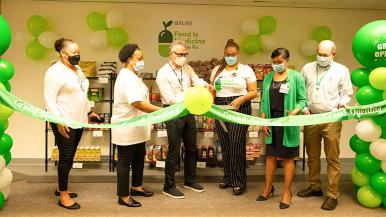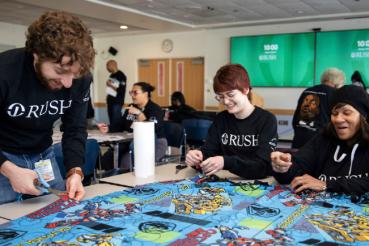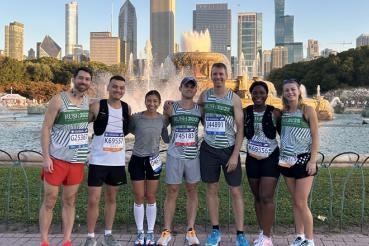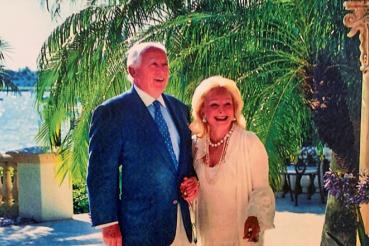“Food is medicine” is a phrase you often hear in the Office of Community Health Equity and Engagement: an indicator of the outsized importance access to healthy food has on a person’s life expectancy and quality of life. Julia Bassett’s work has brought that adage into sharp relief.
“When I began learning about communities of color, health equity, and equitable access to food, I fell in love with the concept of helping others who were less fortunate than myself,” says Bassett, system manager for health and community benefit at Rush University Medical Center. “People have a right to healthy food, to grocery stores, to fruits and vegetables in their diet.”
That's the philosophy behind RUSH's new “Food Is Medicine” program, which is designed to provide a long-term solution to food insecurity for RUSH patients.
Screening for food insecurity
Under the pilot that started May 11, patients in six different clinics at the Medical Center will be screened for potential food insecurity using a series of questions to measure the social determinants of health (non-medical factors that lead to adverse health conditions, like regular access to healthy food).
Those who identify as food insecure will be referred to the Food Is Medicine pantry, where they’ll receive a bag containing healthy proteins and produce. A community health worker will also sign them up for two additional home deliveries. Participants will get help signing up for long-term food assistance like the Supplemental Nutrition Assistance Program (SNAP) or Meals on Wheels, if they are eligible. The program is also partnering with Top Box Foods, a grocer that works with underserved communities in Chicago.
The pantry will be located in Triangle Office Building on the fifth floor. Patients can be referred to the pantry from several clinics across the medical center campus.
“We would be working to find creative ways to support these patients,” Bassett says. “Rush would be a leader in this space. We would be the first hospital in Chicago to create a sustainable approach to addressing food insecurity for our patients.”
Helping community during pandemic
During the COVID-19 pandemic, Bassett, along with program manager Rachel Smith, previously used the same social determinants screening to spearhead a new model of rapid response to food insecurity in Rush’s backyard. In March of 2020, Smith and Bassett spent six days identifying potential food insecure patients, using answers given on the social determinants of health screening. They recruited volunteers to call potential recipients and to prepare and make food deliveries. Volunteers began home deliveries of food on the eighth day.
“We called on everyone, even friends and family, that first day,” Bassett said. “I called my biggest cheerleaders: my mother and my wife. Rachel and I also made deliveries every Friday. We had a good number of volunteers; it helped that during that time people just wanted to get out of their homes and volunteer, it didn’t matter how great of a task it was.”
Home food deliveries continued through June 2020 and then moved to pop-up distributions in Garfield Park. Over time, they eventually distributed food to approximately 18,000 people. And when the last grocery store in West Garfield Park temporarily closed in February, Bassett has worked with volunteers and community partners to develop several weeks of food giveaways to fill the gap until it reopened on Feb. 28. But a long-term solution, Bassett says, is sorely needed.
Seeking more solutions
David A. Ansell, MD, MPH, senior vice president for community health equity and associate provost for community affairs, said Bassett’s leadership has helped make Rush’s food program the success it is today.
“Julia has grown the Rush food program from an idea to a well-developed and coordinated program providing healthy food to our communities, patients and employees,” he said. “She is a one-of-a-kind leader — kind, insightful and able to execute. We are lucky to have her at Rush.”
As RUSH begins rolling out the Food is Medicine pilot, currently funded under a six-month grant by Amazon, she hopes its success will lead to more long-term solutions for Rush’s patients and the neighborhood of West Garfield Park.
“I would love to implement this across our hospital systems,” she said. “To have something stable for our entire patient population. That’s what I really want for this next year.”




